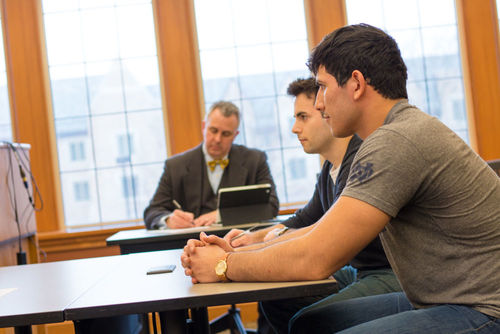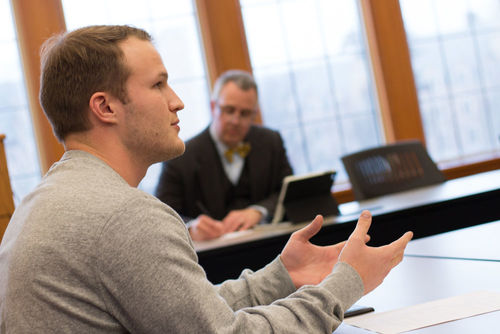ND Law’s Mediation Clinic ‘a great asset for our legal system,’ judge says
 Professor Michael Jenuwine, left, takes notes while students practice mediation skills during a training session in January. // Photos by Alicia Sachau, Notre Dame Law School.
Professor Michael Jenuwine, left, takes notes while students practice mediation skills during a training session in January. // Photos by Alicia Sachau, Notre Dame Law School.
The drama of jury trials might provide plotlines for lawyer movies and TV shows, but in real life – especially in family law cases – avoiding a trial often leads to the best outcomes.
At Notre Dame Law School’s Applied Mediation Clinic, students serve as mediators in civil cases to help people arrive at mutually agreeable terms and avoid the cost and combat of the trial process. Professor Michael Jenuwine, who heads the Mediation Clinic, has also helped build capacity for mediation in the South Bend region by leading courses that qualify attorneys and judges to be listed on the Indiana registry of mediators.
“In Indiana, parenting time and custody issues used to be decided mostly with trials," said Judge David Chapleau, who hears civil cases in St. Joseph County Superior Court in South Bend.
“Now, mediation has really become the norm in family law cases,” Chapleau said. “That’s a good thing because it reflects on the family when parents go through the fierce advocacy of a trial. You can’t help but have the kids know about the battle between mom and dad. That makes mediation very valuable to the kids of our community.”
Chapleau said the Mediation Clinic’s students and Jenuwine’s courses for attorneys and judges have been keys to making mediation more widely available in the South Bend region. Before Jenuwine started leading the registry courses in 2008, legal professionals from the South Bend area had to travel to Indianapolis for the 40-hour mediation training.
“We’re glad the Mediation Clinic is here,” Chapleau said. “It’s a great asset for our legal system.”
In addition to family law cases, the students at the Mediation Clinic work on cases involving discrimination, landlord-tenant disputes, and business dissolutions. They take cases in northern Indiana and southwest Michigan.

“Even if they don’t mediate again, students develop skills that are useful in bringing clients to the middle to meet their needs,” Jenuwine said. “It leads to attorneys who have a mediator mindset. They see the value in counseling clients to open lines of communication and reach a resolution.”
Jenuwine said mediation leads to better outcomes, and that’s especially important for children in family law cases. In addition to being less expensive than going to trial, mediation is a faster process, which enables parents to see their children sooner.
“The nice thing about mediation is it’s a forward-looking process,” Jenuwine said. “We want to know, after you walk out the door, how you are going to make things better for your kids.”
People are also more likely to comply with a mediated agreement, Chapleau said.
“I would rather have parents make their own agreement,” Chapleau said. “If people can reach an agreement, they’re much more likely to comply with that agreement in the future, without enforcement by the court.”